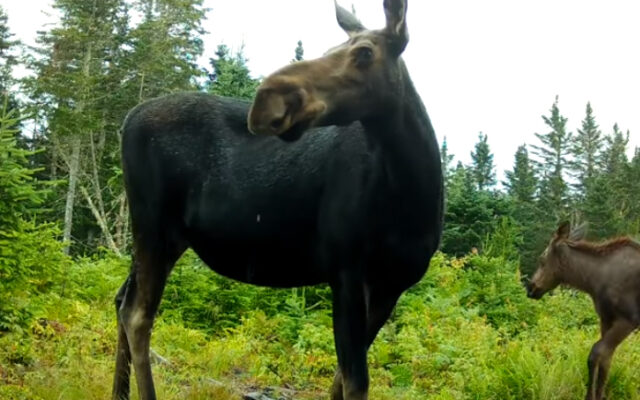
Here is what you said in the state’s moose survey
By Julie Harris, Bangor Daily News Staff
From the effects of development and predation to skewed bull-cow ratios and suggestions about the annual hunt, Mainers recorded their observations about changes in the population of the state’s most iconic animal — the moose — in a management survey.
The Maine Department of Inland Fisheries and Wildlife survey, which closed to comments on Saturday, Aug. 10 sought public opinions on the management of the state’s moose herd and on issues related to the annual hunt. There were more than 280 responses to the management survey and more than 150 in the hunting section.
The MDIF&W is responsible for managing the state’s moose herd for population health and stability and as a hunting and recreation resource. It hired Resource Management, a professional firm that is conducting a scientific survey using random calling and an online town hall where residents and nonresidents can enter their opinions.
The public forum asked participants to offer opinions on the moose population, primary issues the herd faces, trust in MDIF&W to make decisions, conflicts with other hunters, guides, landowners or recreationists, and different changes that could be made to the hunting season.
The prevailing opinion in both forums was that the moose population is declining and that changes to the annual harvest would make the herd healthy again. Most people said they trusted MDIF&W to make the decisions about herd management.
Among suggestions were to reduce or eliminate permits to shoot cows, increase the number of years between permits for a hunter, impose an age or antler size limit on bulls, suspend the hunt for a few years and pass a “blood law.”
A blood law would mean that if a hunter shoots and wounds an animal — thereby drawing blood — but never finds the moose when it runs off, it would count as filling that person’s permit.
Hunters said some of their biggest concerns were current forestry practices in which herbicide spraying in spruce and fir stands kills the food sources that get moose through the winter, climate change, winter ticks that kill calves and over-hunting.
They also were troubled by human encroachment on the herd through increased hunting and development such as wind turbines and power corridors, large landowners who aren’t interested in wildlife management and predation of calves by bears in spring and coyotes.
They also brought up conflicts with upland bird and bear hunters who both hunt with dogs; guides and others who block off access to hunting land where anyone is allowed by the landowner; and irresponsible ATV riders.
Some people suggested the state reconsider all of the hunting seasons that are overlapping. Moose, bear, deer, turkey and grouse hunters are all in the woods at the same time at some points in the fall.
Hunters also commented on the lack of ethics by people who use drones and planes to scout for game, and how some hunters are careless and rude in their behavior toward others in the woods. These folks encouraged the Maine Warden Service to be more aggressive about upholding the laws already on the books, especially regarding drones. It is illegal to use drones to hunt for animals in Maine.
The commenters also thought the moose permit allotment system was unfair. Some hunters have tried for 30 years to get a permit, while others have people in their family get one every year. They also said hunting lodges shouldn’t be given special treatment.
Under state law, the MDIF&W commissioner may allow up to 2 percent of the year’s moose permits for a special lottery for hunting outfitters who meet certain requirements. The lodges that win these permits pay $1,500 for each.
The hunting group had several suggestions about altering the moose hunting weeks, especially to align them better with the annual rut, during which bulls will respond to a cow call hoping to mate.
The moose management survey group said the herd should be managed for the health of the resource, not to please people. They also thought the state should consider introducing a species that would eat the winter ticks, and they had a few concerns about the presence of brain worms in the moose in western Maine especially.
One commenter said the state should buy moose habitat for public access to see them, and others were concerned about the loss of winter habitat because of how private landowners manage their properties.
A licensed forester said the herd needs tough love for the health of the remaining animals and the forest. He was in the woods from the 1980s until 2015 and observed an increasing trend of an unhealthy herd, he said.
Another commenter pointed out that between hikers, campers, ATVers and hunters of various species, there are more people in Maine’s woods than ever before, making animal management even more challenging.
The state will compile the points people made through the two public forum threads, plus the formal scientific poll by Resource Management, and use the information to help craft the next phase of moose herd management in Maine. All results will be compiled and made available to the public, according to the MDIF&W.